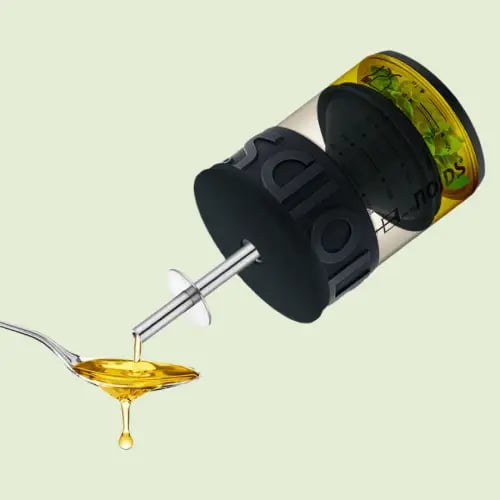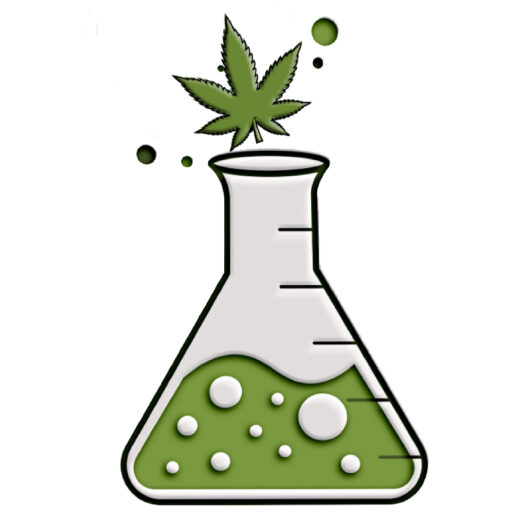Many people are discovering the health benefits of MCT oil. Most commonly, people are taking MCT oil to help with weight management and increasing energy levels. However, there is another side to MCT oil that is even more functional.
MCT oil improves skin hydration and oil balance, and works well as a carrier oil for cannabis infusions. This unique combination can amplify the therapeutic effects and create a custom regimen tailored to individual needs.
Table of Contents
What Is MCT Oil?
MCT oil is a type of fat commonly extracted from coconut oil. It is known for its unique properties and numerous health benefits.
Where Does MCT Oil Come From?
MCT stands for Medium-Chain Triglycerides. The INCI is Caprylic/Capric Triglycerid. These fats are most commonly sourced from coconut oil, which contains roughly 50% MCTs. Palm kernel oil is another source, but coconut oil is more prevalent and is my preferred choice. It is often separated from solid coconut oil through simple processes like fractionation.
Many foods contain long-chain triglycerides, but MCTs have shorter fatty acid chains. This difference allows them to be quickly absorbed and utilised by the body giving a quick source of energy.
MCT Oil vs. Coconut Oil
MCT oil and coconut oil are frequently confused, but they are quite different. Coconut oil contains a mix of various fats, including both MCTs (medium chain triglycerides) and LCTs (long chain triglycerides). MCT oil, however, is purely composed of medium-chain triglycerides.
MCT oil:
- Concentrated source of medium-chain triglycerides.
- MCT oil is a supplement that is popular for quick getting quick energy.
- Rapidly absorbed and used for energy.
- Often used in supplements and skincare routines.
Coconut oil:
- Contains approximately 54% MCTs and other longer-chain triglycerides.
- Used in cooking where it provides flavour and texture.
- Often used in massage products for good lubrication and glide.
- Included in many hair care formulations for its moisturising and conditioning effects.
- It contains Lauric Acid, which gives antimicrobial and moisturising properties.
MCT Oil in Diet and Nutrition
MCT supplementation is popular in many diets because it can have health benefits, particularly for weight management and energy levels. It’s often included in ketogenic diets, making it a significant part of many nutritional plans.
What Is MCT Oil Used For?
Medium-Chain Triglyceride Oil is praised for its quick absorption and energy-boosting properties. It’s often used to enhance weight loss, as it can promote a feeling of fullness. However, be aware that as a source of saturated fat, this can also contribute to weight gain.
It’s also found to improve cognitive functions by providing an immediate source of energy to the brain. Athletes and fitness enthusiasts often use it to increase endurance during workouts.
Incorporating MCT Oil Into Your Diet
Incorporating MCT Oil into your diet can be straightforward. I recommend starting with small amounts to see how your body reacts – try just 1 or 2 teaspoons per day to start with and see how you feel.
You can mix it into salads, smoothies, or even cooking. If you’re following a ketogenic diet, MCT oil helps maintain ketosis by providing a readily available source of fat.
Always avoid heating it to high temperatures, which can degrade the oil’s nutritional value.
Bullet-Proof Coffee

Bullet-Proof Coffee is a very common way to include MCT Oil in your daily routine. It combines coffee, MCT Oil, and unsalted butter or ghee. This mixture can provide sustained energy and can help with fat loss.
To make it, blend 1 or 2 tablespoons of MCT Oil and the same amount of unsalted butter with a cup of brewed coffee. The resulting drink is creamy and rich, making it a popular breakfast option for those on a ketogenic diet.
Many people use cannabis-infused butter (cannabutter) as this is an effective way of microdosing with cannabis.
MCT Oil In DIY Skincare

- I often use MCT oil in homemade lotions and creams. Its anti-inflammatory properties can soothe irritated skin. Additionally, MCT oil is non-comedogenic, meaning it won’t clog pores, making it ideal for those with acne-prone skin. If this interests you, check out this blog Make Cannabis Lotion at Home.
- MCT oil is a popular ingredient in DIY skincare due to its lightweight texture and fast absorption. It acts as a carrier oil, helping to deliver essential oils and other active ingredients deeper into the skin.
- I’ve used MCT oil for years and found that its light texture is great for homemade lotions and serums. Its natural emollient properties improve skin health without clogging pores. When used in cannabis preparations, the oil’s quick absorption ensures a faster onset of effects and even better bioavailability.
- MCT oil also serves as a base for natural makeup removers. Its ability to dissolve even waterproof makeup without stripping the skin of its natural oils is impressive. It’s very effective when mixed with Castor oil, which is usually too thick and sticky to feel good on the skin. The combination together is effective and elegant.
MCT Oil and Cannabis
MCT oil is a versatile medium-chain triglyceride that enhances the absorption and efficiency of cannabis when used together. Its use can improve the bioavailability of cannabinoids, offering potential benefits for both recreational and medicinal applications.
Cannabis-Infused MCT Oil
Infusing MCT oil with cannabis involves decarboxylating the cannabis to activate compounds like THC and CBD. This procedure guarantees the utmost effectiveness. I use the POT by NOIDS herbal infuser for this. MCT oil acts as an effective carrier oil, helping to deliver these compounds more efficiently. Cannabis-infused MCT oil is often used for topical applications, or adding to edibles.
To infuse cannabis using the POT by NOIDS, first decarboxylate your cannabis. Choose between two settings: THC or CBD. Opt for the CBD option, place the cannabis in the included glass beaker, and let it do its work. The PBN comes with a snug silicone lid to minimise odour. This process involves heating the cannabis at a specific temperature to activate THCa and CBDa cannabinoids.
After decarboxylation, add enough MCT oil to cover the cannabis, then place it in the POT by NOIDS. Select the CBD oil infusion setting and let it run its course.
When it has finished, attach the strainer to the beaker and strain the infused oil into a bottle or jar for storage. The strainer is highly effective, leaving behind no residue, just pure CBD-infused oil. Try this free Body Butter recipe.

MCT Oil Side Effects
MCT oil, while considered generally beneficial, can cause potential side effects.
- Gastrointestinal Issues – I’ve noticed that consuming too much can sometimes lead to stomach discomfort. Common issues may include diarrhoea, cramping, and nausea. MCT oil’s effects are stronger when you take supplements suddenly or in excessive amounts. Always start with a very low amount.
- Impact on Cholesterol Levels – MCT oil sourced from coconut oil may affect cholesterol levels. Some studies indicate that it could increase low-density lipoprotein (LDL) cholesterol, which might not be ideal for heart health.
- Allergies – Although rare, I have heard that it may cause allergic reactions. Symptoms might include skin rashes, itching, and swelling. It’s crucial to be aware of any adverse reactions when first using MCT oil. Side effects from MCT oil are usually temporary. They can happen because the oil gets rid of extra bacteria in the gut, which causes a detox reaction in the body.
- Interference with Ketosis – For those on a ketogenic diet, use of MCT oil might disrupt ketosis if not carefully managed. Too much MCT oil can lead to excess calorie intake, potentially affecting weight loss efforts.
- Interaction with Medications – It’s important to consider that MCT oil may interact with certain medications. I recommend consulting a healthcare provider before incorporating MCT oil supplements, especially if you’re taking meds for chronic conditions such as heart disease or liver problems.
In small amounts, MCT oil is generally safe. Moderation and gradual introduction are key to minimising any possible side effects.
Conclusion
Hopefully you are now excited to start adding MCT oil to your DIY skincare. Its light texture and moisturising properties make it ideal for lotions, serums, and cleansers.
MCT oil also finds its place in the area of cannabis-infused products. Its fast absorption rate makes it an excellent carrier oil for cannabinoids, enhancing their effects.
Incorporating MCT oil into skincare routines and cannabis products can maximise the potential benefits. It’s important to source high-quality MCT oil to ensure the best results.
By understanding the unique qualities of MCT oil, you can make informed choices in your skincare and wellness practices. The versatility of MCT oil makes it a valuable addition to DIY skincare.

If you liked this blog post, I would love it if you shared it with a friend.
If you use Pinterest, please pin this post.
*As a POT by NOIDS affiliate, I earn from qualifying purchases.
*As an Amazon Associate, I earn from qualifying purchases.









